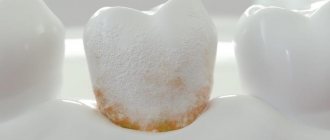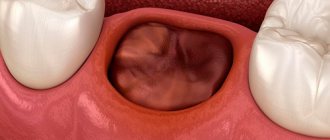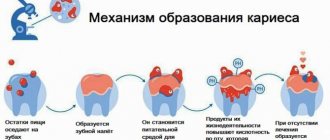Bad breath: physiology or disease?
Bad breath
in medical language it is called
halitosis
. There are physiological and pathological halitosis. Bad breath often appears in the morning. During the night, bacteria and their metabolic products accumulate in the mouth, which causes a bad odor. This type of halitosis is physiological and can be eliminated by simply brushing your teeth. Physiological halitosis also includes odor caused by eating a number of foods, such as garlic, onions, cabbage. This smell will disappear on its own as soon as the substances that caused it are eliminated from the body. But it also happens that an unpleasant odor is not eliminated using hygiene procedures; in this case, most likely, it is of a pathological nature.
How to get rid of the smell of rotten eggs
If you break a rotten egg in a hurry or the test for rottenness does not produce results, then you are faced with the problem of how to get rid of the smell. Naturally, food spoiled by rotten eggs will have to be thrown away. In the kitchen, open the windows to create air circulation.
In a saucepan on the stove, put water and vinegar to boil, put 1 teaspoon of vinegar per 100 ml of water, you can also add any essential oils with a pleasant smell, especially lemon or orange essential oil. Put spices in the water - cinnamon, nutmeg, cloves. The smell of vinegar will soon disappear along with the smell of hydrogen, and the smell of spices will return coziness to your kitchen.
Eggs are the basis for preparing various dishes, as every housewife knows. In addition, they provide the body with many nutrients. But to get this effect, you need to consume only fresh products. Otherwise, you can cause serious harm to your health. To protect yourself from negative consequences, you need to figure out how to check the freshness of eggs before purchasing and at home.
Bad breath: causes
The most common cause of unpleasant odor is the active activity of pathological bacteria in the oral cavity. Diseases such as caries, periodontitis, pulpitis, periodontitis, gingivitis, stomatitis, as well as the formation of tartar can lead to persistent bad breath.
The second place among the causes of unpleasant odor is dry mouth (the medical term is xerostomia
). Mica, which moisturizes our mouth, has bactericidal properties. It kills bacteria, neutralizes their waste products, rinses and cleanses the oral cavity. If there is not enough saliva produced, bacteria are activated, resulting in an odor. Dry mouth can be a consequence of illness or taking a number of medications. It can also be caused by age: over time, the salivary glands begin to work less intensively, the composition of saliva changes, and its antibacterial properties are lost.
The smell can also be caused by ENT diseases: sore throat, chronic tonsillitis, sinusitis, runny nose.
Another cause of unpleasant odor is diseases of the internal organs. It can be:
- renal failure;
- liver failure;
- gastric diseases (gastritis, stomach ulcer);
- lung diseases.
Smoking is also a cause of persistent bad breath. The smell is caused by substances contained in tobacco smoke and deposited in the oral cavity. The only way to eliminate the unpleasant odor in this case is to quit smoking.
The danger of hydrogen sulfide in a well
The permissible concentration of this substance is 0.03 mg/l. Let's consider the effect of hydrogen sulfide in well water.
- If you inhale air with a low concentration of hydrogen sulfide, oxygen will be less well transported through the circulatory system, the person will begin to feel sick and dizzy, signs of poisoning and discomfort in the epigastric region will appear, and loss of vision will occur.
- High concentrations of hydrogen sulfide will cause a person to fall into an unconscious state, experience convulsions, and pulmonary edema.
- If you drink water in which sulfur is dissolved, metabolic disorders will occur.
- The person will cease to feel taste and smell.
- If hydrogen sulfide combines with hemoglobin, a person will begin to suffocate.
- When inhaled, hydrogen sulfide causes inflammation of the mucous membranes.
What to do if there is hydrogen sulfide in the well? It is impossible to use such water as technical water; it is not recommended to water garden plantings with it. Due to the fact that you inhale the gas, your body will be poisoned. And if sulfur gets into the soil in large quantities, it will negatively affect the plants, as a result they may even die.
A sulfur solution exhibits the properties of an acid. Combining with iron contained in water, it forms iron sulfide salts. This substance is deposited inside pipes and household appliances, causing rust to form. The most unpleasant thing that can happen is that the water pipes become overgrown.
To prevent this from happening, it is necessary to remove hydrogen sulfide from the well. Next, we will consider what methods exist to combat sulfur dissolved in water.
What is bad breath like?
Peculiarities of odor can indirectly indicate the source of problems.
Hydrogen sulfide smell
(the smell of rotten eggs) indicates rotting protein substances. This smell is typical for digestive problems. A persistent hydrogen sulfide odor may indicate gastritis with low acidity or a stomach ulcer.
Sourish smell
and a corresponding taste in the mouth is noted with gastritis with high acidity. This smell may appear at an early stage of the disease, when other symptoms are not yet present.
Bitter smell
and the taste in the mouth is typical of liver and gallbladder diseases. An additional symptom is the appearance of a yellow coating on the tongue.
Smell of acetone
and the accompanying sweet taste in the mouth is a characteristic symptom of diabetes.
Urine smell
from the mouth indicates a disease of the genitourinary system (primarily the kidneys or bladder).
Stool smell
from the mouth can occur due to intestinal diseases (dysbacteriosis, intestinal dyskinesia, intestinal obstruction).
Putrefactive
bad breath is typical for dental diseases (inflammatory processes of teeth and gums).
Cause of rotten stool smell
Important! A rotten, pungent odor indicates a malfunction in the entire gastrointestinal tract. In each specific case of the development of the disease, in addition to smell and color, it is accompanied by the appearance of additional elements in the stool. If the bowel movements include foam and mucus, the reasons for this are inflammation of the colon, which has been progressing for a long time and has become acute.
- If the stool smells like rotten eggs and has blood clots, this indicates an acute intestinal infection. In this case, you must definitely consult a doctor.
- Mucus is a signal of damage to the intestines by pathogenic bacilli, the development of infection and the presence of an inflammatory process.
- White foam in the stool indicates an infection of the colon.
- Eating spoiled foods. Subsequently, the patient develops poisoning, accompanied by diarrhea and vomiting.
- Excessive indulgence in foods rich in fiber. These can be watermelons, bran bread, sprouted grains. Diarrhea can also occur due to unripe fruits and berries.
- Protein diet. Excess protein foods (meat, eggs) cause stool with the smell of hydrogen sulfide
With diarrhea, an adult or child may also experience fever and severe thirst. It is recommended to consult a doctor to determine a diagnosis and prescribe a treatment regimen.
Bad breath: what to do?
The fight against bad breath begins with careful adherence to good oral hygiene. If the source of the odor is bacterial activity, proper brushing of your teeth will help. Teeth should be brushed not only from the outside, but also from the inside, and also treat the chewing surface of the teeth. The brush angle should be 45°. Using dental floss, hard-to-reach areas between teeth are treated. If your teeth are in poor condition, simply brushing your teeth will not solve the problem. You will need to visit a dentist and remove tartar, and if your teeth have caries, cure them. It is recommended to visit the dentist at least once or twice a year.
It is also necessary to combat dryness of the oral mucosa. If you feel dry mouth, take a few sips of water and rinse your mouth. However, it should be remembered that frequent dry mouth can be a symptom of serious diseases. However, like the unpleasant smell itself. Therefore, if you have persistent bad breath, you should definitely see a doctor and undergo an examination.
How to identify a disease with a symptom of rotten egg odor from the mouth?
When the smell of ammonia or hydrogen sulfide appears from the mouth of an adult, the reasons are also very different, so identifying them can be very difficult. The main thing to do if the symptom recurs is to immediately consult a doctor as soon as the breath from your mouth resembles the unpleasant smell of rotten eggs or meat .
Before visiting a doctor, you should pay attention to other signs of abnormalities in the body. Perhaps these symptoms will tell the doctor exactly where to look for the problem, and then treatment will help get rid of the unpleasant smell of rotten eggs from your mouth as quickly as possible.
The patient will have to undergo the following procedures:
- Pass the necessary tests (blood, urine, feces);
- Undergo an ultrasound of the abdominal cavity (liver, pancreas);
- Undergo gastroscopy or fibrogastroduodenoscopy.
After these procedures, the doctor will prescribe the optimal treatment in accordance with the identified problems.
How to remove the smell of water from a well: ferrous, earthy, gasoline
- Fighting earthy/swampy odor. Flushing the well shaft with a pump pump will help here. This removes organic deposits and decomposing particles.
- Fighting iron odor. Special filters of various types are used (iron removal), which are selected after chemical testing. water analysis.
- Fighting the smell of phenol, iodine and other chemical compounds. Reverse osmosis filters and disinfection are used. The last option is to dig a well in another place.
- Fighting the smell of petroleum products. Using a carbon filter to clean the well.
Whatever water odor you notice in your water, remember that there are ways to completely eliminate it. The main thing is not to start the problem and immediately analyze the water from the well!
Rotten smell of stool in an adult and color of stool
An important criterion in determining the disease and the causes of indigestion is what color the stool is:
- Yellow stool that smells like rotten eggs indicates food intolerance or extreme stress.
- Green color may be a sign of the development of dysbiosis, salmonellosis or dysentery. Also, a greenish tint is a consequence of the introduction of new foods into the diet, especially for children.
- White feces are a sign of food oversaturation with carbon and calcium, and can occur with excessive consumption of dairy products.
- Stool that smells like rotten eggs is red, almost burgundy, and occurs when inflammatory processes in the intestines begin and malignant tumors appear.
- The black tint of feces in an infant or an adult is caused by the presence of E. coli and helminths.
For the most effective treatment of a condition in which stool smells like rotten eggs, it is recommended to limit food intake and adhere to a diet. For children and infants, exclude new complementary foods and foods in the diet, replace water with chamomile decoction.
Drug treatment
If your unpleasant odor is episodic, then the following drugs can help: mezim, pankteratin, smetka festal and sobrents.
Let's take a closer look at the medications that are most often prescribed by doctors:
- Phosphalugel is a product based on aluminum phosphate. It is he who helps extinguish hydrochloric acid in the body. Has an absorbent and enveloping effect. The most commonly prescribed drug for gastritis of any kind. The daily dose of medication is 3 packets per day. Dissolve the contents of the package in half a glass of water and drink; it tastes pleasant. May cause constipation.
- Mezim is an enzyme preparation consisting of pancreatin. Significantly facilitates digestion, especially when overeating. The dosage is calculated individually and depends on the current problem. But usually it is 1-2 tablets a few minutes before meals. Do not use if you have been diagnosed with pancreatitis.
- Periodontocide is an analgesic, antimicrobial and anti-inflammatory solution that is prescribed for diseases of the oral cavity. But they often become the cause of rotten breath. Rinse your mouth twice a day, dissolving 15 drops of the product in a quarter glass of clean water. Contraindicated for pregnant women and during lactation.
- Asepta - napkins shaped like a fingertip. They have an anti-inflammatory effect and are indicated for gum disease. They wipe problem areas several times a day. Each fingertip is used only 1 time. May cause allergies; perform a sensitivity test before use.









